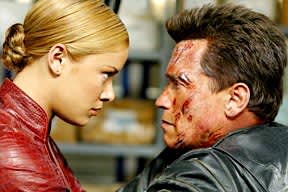Writer/director James Cameron didn't reinvent the wheel in 1984 with his tale of a killing machine sent back in time to alter the course of human history. He didn't originate the idea of the relentless pursuer. Those ideas were commonplace tropes of pulp novels and B-movies he just added smart writing, a sense of visual style and a brain. But the third instalment of the series and the first in which Cameron had no involvement takes away exactly what Cameron provided in the first place, returning the series to its ignominious B-movie past.
Don't even bother going to T3 if this seems familiar: John Connor (Nick Stahl replaces Edward Furlong) is the future leader of humankind; a new Terminator robot is sent back through time to kill him while an increasing outdated Terminator model (Arnold Schwarzenegger) comes back to protect him. The killer terminator will not stop until John Connor is dead. Smash, smash, destruction, relentless chasing, special effects, more destruction, the end.
Adding to Cameron's absence, Terminator 3: Rise of the Machines loses several key elements: Connor's mother (played by Linda Hamilton), the heart of the first two films, has died, and with her went the feminist subtext that underscored Terminator 2 in particular. Without that contrast, the Terminator/protector as father figure theme is largely ignored. The relentless pursuer now comes in female form (played stone-faced by model Kristanna whatshername), but is a boring photocopy of T2's Robert Patrick, who at least added some deadpan humour to his jog. She's liquid metal, she controls other machines and yet still isn't smart enough to not revert to the same form, which allows her prey to see her coming.
In many ways, T3 in the hands of director Jonathan Mostow (U-571), is a movie on a treadmill. From the first two he saw only the action sequences and the fight and flight premise he missed the character development, snoozed through its social relevance, and didn't have the visual acuity to note Cameron's skills as a storyteller. He amps up the smash an early chase sequence involving a crane truck is a new pinnacle in excess but dumbs down the "boring" parts. You know, the ones involving human emotion or an engaging narrative. We're left with old, tired Arnie barely able to muster up the strength to even explain who he is to newcomers. A sad end to one of the genre's classic accomplishments. (Warner)
Don't even bother going to T3 if this seems familiar: John Connor (Nick Stahl replaces Edward Furlong) is the future leader of humankind; a new Terminator robot is sent back through time to kill him while an increasing outdated Terminator model (Arnold Schwarzenegger) comes back to protect him. The killer terminator will not stop until John Connor is dead. Smash, smash, destruction, relentless chasing, special effects, more destruction, the end.
Adding to Cameron's absence, Terminator 3: Rise of the Machines loses several key elements: Connor's mother (played by Linda Hamilton), the heart of the first two films, has died, and with her went the feminist subtext that underscored Terminator 2 in particular. Without that contrast, the Terminator/protector as father figure theme is largely ignored. The relentless pursuer now comes in female form (played stone-faced by model Kristanna whatshername), but is a boring photocopy of T2's Robert Patrick, who at least added some deadpan humour to his jog. She's liquid metal, she controls other machines and yet still isn't smart enough to not revert to the same form, which allows her prey to see her coming.
In many ways, T3 in the hands of director Jonathan Mostow (U-571), is a movie on a treadmill. From the first two he saw only the action sequences and the fight and flight premise he missed the character development, snoozed through its social relevance, and didn't have the visual acuity to note Cameron's skills as a storyteller. He amps up the smash an early chase sequence involving a crane truck is a new pinnacle in excess but dumbs down the "boring" parts. You know, the ones involving human emotion or an engaging narrative. We're left with old, tired Arnie barely able to muster up the strength to even explain who he is to newcomers. A sad end to one of the genre's classic accomplishments. (Warner)
